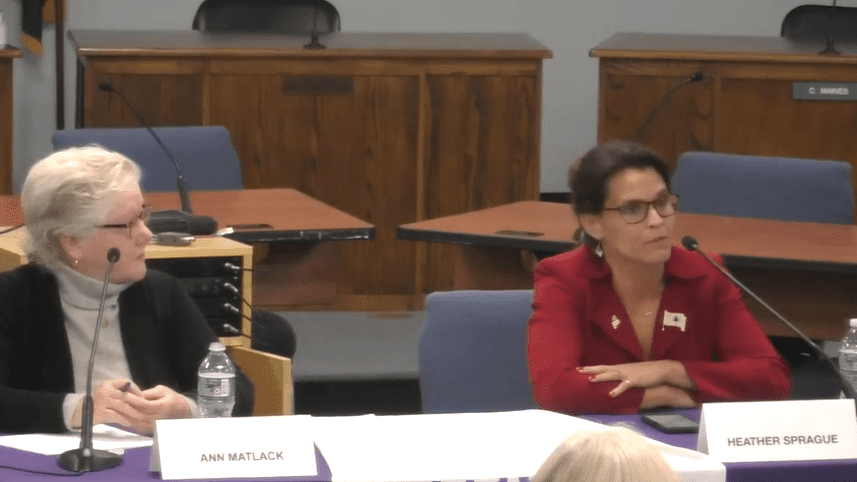After more than three decades of working in municipal government, Bangor city clerk Lisa Goodwin is confident that Maine’s election system is safe. But with national tensions rising ahead of a potentially pivotal Election Day, she does not want to take chances.
That was why Goodwin volunteered Bangor as one of the first municipalities to take part in an election systems assessment offered to Maine through the Cybersecurity and Infrastructure Security Agency, part of the Department of Homeland Security. In general, the assessments review physical security elements, like where sensitive election information might be stored, who has access to it and what safeguards are in place to make sure the information is not compromised.
Goodwin said what the assessment found is confidential and the recommendations are voluntary. Although attempts to intimidate election officials across the country have increased, there have not been incidents in Bangor, the city clerk said. Still, it pays to be proactive.
“We don’t want to be reactionary,” she said. “We want Bangor to be as safe as it can be.”
That’s the general mood of many Maine election officials ahead of Election Day. The state has not seen brazen behaviors like the monitoring of ballot drop boxes, as in Arizona, or the preemptive filing of lawsuits to challenge election results, local and state officials have said. Those efforts have come predominantly from conservative groups.
But there are still signs of election doubt that created a sense of wariness in the weeks leading up to Nov. 8. In Rockland, a state representative candidate forum got heated after the moderator asked if the 2020 election of President Joe Biden was legitimate. Election officials have seen copycat requests for election data fueled by misinformation that hamper their ability to do their job. Officials are optimistic but cautious in the last few days before the polls open.
“We’re doing as much voter education as possible and encouraging them to use trusted resources if they have any questions about anything,” said Maine Secretary of State Shenna Bellows.
Bellows said the CISA partnership was brought about after listening to clerks talk about needing more security training in general, specifically in the cybersecurity arena. The state held a training on that topic last winter and continued talking with the agency to develop a physical infrastructure assessment opportunity. The program was offered to the first 10 municipalities that signed up when Bellows reached out on Sept. 13: Bangor, Lewiston, Durham, Bath, Benton, Old Orchard Beach, Lisbon and Waterville. Maine also offered clerks de-escalation training this summer in case clerks or voters are threatened.
New laws passed this year also provide more security: It is now a misdemeanor to interfere with an election worker. The chain of custody of ballots was strengthened to explicitly say only clerks can possess them unless expressly told to transfer them by the Secretary of State’s office.
Bellows said her office will have extended hours to handle voting questions, and will check in with clerks throughout Election Day. The U.S. Attorney’s Office will also be available through a hotline (207-771-3214 or 207-262-4615) to answer questions.
While Maine may not have seen the kind of organized attempts to undermine its election integrity as in other places, Anna Kellar of the League of Women Voters of Maine said there have been isolated incidents. The group has heard of clerks getting intimidating messages and candidates who push election conspiracy theories.
The nonpartisan group held candidate forums this year to get more information out about local races, but it was not always easy to get candidates to participate, Kellar said. Some were simply not interested, while others questioned the neutrality of moderators. Another flare-up of election doubt emerged this year when dozens of GOP candidates refused to answer a Bangor Daily News questionnaire in part because it included a question on the security of Maine’s elections.
The episodes showed Kellar that election mistrust is a growing problem in the state.
“The politics shifting around us has made it harder to get out information,” Kellar said.
It could work against candidates: The Maine Republican Party put out an email Thursday that looked to assure voters that ranked choice voting is a legitimate method, saying there are others looking to sow confusion about it. Ranked choice voting is used in the general election for federal offices and may be a factor again in the 2nd Congressional District rematch between Democrat Rep. Jared Golden, Republican Bruce Poliquin and independent Tiffany Bond. In 2018, Poliquin challenged the results of the three-way contest that Golden won.
The Republican email encouraged people to only vote for the same candidate in each round rather than ranking candidates by preference. The email from its executive director, Jason Savage, assured supporters it had been in touch with the Secretary of State’s office on the subject.
The tension around voting security was obvious at a League of Women Voters’ Oct. 21 forum for the coastal House District 43. The debate touched on topics from lobstering regulations to police funding, but members of the crowd became hostile when moderator Ann Luther asked candidates Rep. Ann Matlack, D-St. George, and Republican challenger Heather Sprague of Cushing if Biden was legitimately elected, and if they would accept the results of the election. The question was submitted by audience members, according to the League.

Sprague had been identified by the progressive Maine Beacon news site as having expressed doubts about the validity of the 2020 election in a past Facebook post that appears to have been removed. At last month’s forum, she responded that the question had nothing to do with her district, leading to applause from some in the crowd. When Luther said the question was legitimate, a man in the crowd accused her of violating the U.S. Constitution by pushing for additional information.
“You’re putting your actual beliefs before the U.S. Constitution,” he said. The man shortly thereafter left and the forum continued.
Sprague, in a later interview, said she did not feel the question was fair and was meant to make her look bad. She disagreed that she is an election denier, saying that although she believes there was some election fraud in the country, she could not prove it and people should move on. She said she would accept the election results Tuesday because she believes Maine is “pretty good” when it comes to secure elections.
It has been difficult to convince some voters of that, she said.
“Some people weren’t going to vote and I had to convince them,” Sprague said. “Regardless of what happened (in 2020), we have this election now.”
Matlack, who said she believed the election was legitimate, was shocked by the crowd’s response. That level of anger and distrust around the subject has been growing since two years ago, she said. It can make it difficult to even talk about election issues.
“People will get very passionate and very angry, and they shut the conversation down,” she said.
Caitlin Andrews covers state politics and elections for The Maine Monitor. Reach her with story ideas by email: caitlin@themainemonitor.org.





